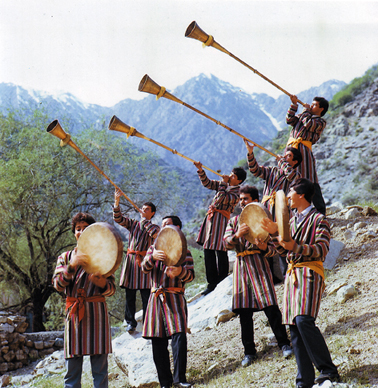In an occasional series Daniel Kalder examines the literary endeavours of the world’s dictators. This week we learn of the dictator of a new and rather obscure nation who took a hands-on approach to Orwell’s dictum that he who controls the past, controls the future.
The collapse of the USSR brought catastrophe to the central Asian republic of Tajikistan. Between 1992 and 1997, a civil war raged between forces loyal to the Soviet regime and the United Tajik Opposition, which contained a strong Islamist element. By the time collective-farm-boss-turned-president Emomali Rahmonov had established order – with help from Moscow and Uzbekistan – between 60,000 and 100,000 people had died, while a further 730,000 had been displaced. The war cost Tajikistan $7bn – and it was the poorest central Asian state to begin with.
Rahmonov spent the war’s aftermath pursuing his enemies and holding rigged elections, while struggling to improve the economy and strengthen state institutions. He also found time to write a book, The Tajiks in the Mirror of History, which he intended would furnish the Tajiks with a new, dignified, post-Soviet identity. “In the course of its history and development,” says Rahmonov, “the Tajik nation has been confronted by all sorts of vehement opponents who doubted its very existence.” Thus, in addition to all its other problems, Tajikistan also faced a serious existential crisis: nobody believed it was real.
Rahmonov sought solutions in the region’s pre-Islamic past. His thesis is simple: the Tajiks are an ancient nation, whose achievements have been neglected or appropriated by their neighbours. Reclaiming these stolen glories, Rahmonov reveals that the ancient central Asian states of Bactria and Sogdiana were “countries” which should be regarded as the “… origins of first Tajik state”. The best period in Tajik history was that of the Samanid State of 819-999AD. Controversially, he also declares the ancient Iranian prophet Zoroaster a local boy. Apparently, Zoroaster fought “atheism” while the Tajiks were always “patriotically minded … ready to defend the principles of progress and enlightenment”. Of course, these ideas weren’t invented until much later and in Europe to boot, but never mind. Rahmonov also notes that the Avesta of Zoroastrianism is superior to the works of Homer because it is older and has more words (2m v 345,000). Thus, the ex-communist apparatchik essentially replaces the Marxist myth of a future golden age with its much older ancestor: the lost golden age.
For all his anachronisms and eccentric arguments, however, Rahmonov isn’t entirely wrong. The Tajiks are descended from the ancient Iranian peoples of central Asia, and Zoroastrianism was widely practised in the region. But the history of central Asia is one of invasions, collapsing empires and population transfers. While the term “Tajik” existed prior to the Soviet invention of Tajikistan in 1924, nationalism, or even an identity based on ethno-linguistic criteria, did not: tribe, clan and religion were more important. As a result, when the Bolsheviks imported “scientific” European categories of identity, the locals often did not know who they were supposed to be – which makes Rahmonov’s claims of an ethnic Tajik nationalism stretching back into the ancient past highly dubious.
But Rahmonov is a dictator, and one of the perks of the job is that you can redefine the past as you please and few will dare to disagree with you. Thus not only does he claim Zoroaster for the glory of the Tajik nation, he also throws out all the bothersome theological stuff. Rahmonov’s Zoroaster is barely religious at all, but rather a transmitter of uncontentious moral values, while the Avesta serves as an ethnographic guide to past Tajik greatness. Like the categories of identity, history and territory Rahmonov lifts wholesale from Tajikistan’s Soviet founders, this secularising of sacred history is also an old Soviet strategy.
Also striking is Rahmonov’s profound aversion to Islam. Having just fought a war with Islamists, with the Afghans as neighbours and the Iranians as cousins, Rahmonov strenuously avoids mention of the majority faith of Tajikistan. When he does touch upon it, he implies that it is alien to the “true” Tajik identity: Islam came with the Arab conquest, he explains, and “the religion of our forefathers was prohibited by the force of the sword … The new authorities observed the people and put a watch on their houses, forcefully imposing on them the rules and habits of Muslim law … many of them were forced to accept the new faith established by the invaders.” In 2007, authorities in Dushanbe shut down 300 mosques, leaving only 57 open. The rest were converted for secular use, showing once again that you can take the apparatchik out of the USSR but you can’t … etc. Clearly, Rahmonov prefers his faiths ancient and nearly dead.
Since publishing TIMOH, Rahmonov has written many more books and elaborated greatly upon his love of Zoroaster. He placed Zoroastrian symbols on the national flag; the government’s online news agency is named Avesta and, in 2007, he dropped the Russian suffix from his surname, while urging his countrymen to do the same. He also demanded that the British Museum surrender the Oxus Treasure, which was found on the territory of (the not yet-extant) Tajikistan in the 19th century.
And yet, turgid and unreliable as TIMOH undoubtedly is, it could be much worse. Rahmonov, unlike his late neighbour Saparmurat Niyazov, doesn’t elevate himself or his family into holy figures, or insert his own rancid poetry into the text, or dribble on about how the Tajiks are descended from Noah. And you can do a lot worse than Zoroaster when it comes to ethical teachings. Alas, Tajikistan inevitably falls short of the prophet’s high standards: political corruption, embezzlement, and bribery are rife. The state’s policy of ethnic nationalism may ultimately prove divisive in a country where a third of the population is Uzbek. Still, we can dream, and in TIMOH, Rahmonov dreams for an entire nation. Like the man says, “True patriotism and political wisdom will prevail so that the country may take its deserved place in the international arena.”
Amen.













I love all those central asian republics, would definately love to visit that region on a road trip (fully tooled up of course)
I’ve been to Almaty in Kazakhstan a couple of times and was very pleasantly surprised – a beautiful mountainous setting, lots of trees and not too many tower blocks. Akmola, the new capital, is supposed to be the Dubai of Central Asia, not exactly a recommendation but quite a sight, apparently. However, the Kazakhs regarded Tajikistan as a wholly different – and much wilder – kettle of fish.
‘Samanid State’ name of my new ethno-techno live act, hitting all the big festivals this summer
Seems like every time I turn around Central Asia has spawned another -istan. Tajikistan, I discover, are at number 134 in the FIFA football rankings, level with Vietnam and just above the Faroe Islands.
Third from the right in the brass section looks like Stan Getz-stan or is that the Tajik’s air defence corps during trials of the latest Soviet made copy of the 20mm Flakvierling 38.
Almaty is nice, I agree, but Ashgabat in Turkmenistan is mind bending.
Never been to Tajikistan, alas. However I was reading a book about global crime recently and learned that the country’s most recent major contribution to world culture is Viktor Bout, reportedly the world’s #1 illegal arms dealer, currently sitting in jail in the US awaiting trial.
Just remembered there are some lovely passages about the walnut woods of Kirghizstan in Roger Deakin’s Wildwood. It sounded a wonderful place to visit.
..true that Gaw, that was my favourite chapter of Wildwood